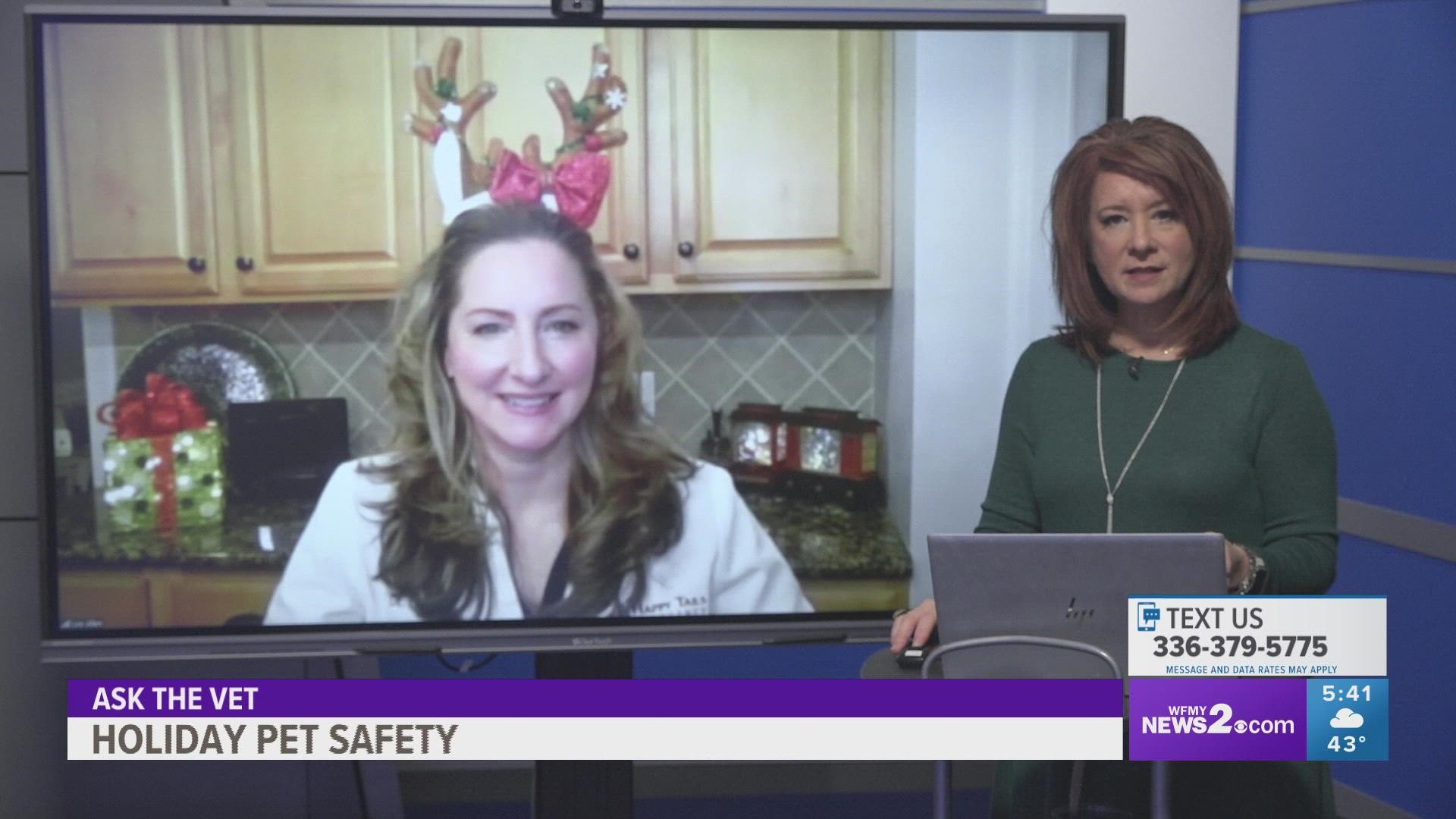GREENSBORO, N.C. — Puppies are a popular gift for Christmas, but if you're going to be a new pet parent there's a lot to navigate especially during the holidays.
To help navigate this time, Dr. Kelley Gebhardt with Happy Tails Veterinary Clinic joined 2 Wants to Know to talk about the major things for pet parents to know.
New puppy tips
- Remember it is a lifelong commitment, and new pets (young or old) will require a commitment to spending time with them to help them adjust. If you have a lot going on or are not able to provide a safe environment for their adjustment to their new home, then it might not be the best time to add a new pet to the household.
- Separating puppies from their mother earlier than 8 weeks old can negatively impact their social and emotional development.
- Things to buy:
- Purchase a crate and properly crate train new pets. This will help keep them safe and out of trouble.
- Appropriate toys for physical and mental stimulation.
- Proper chew toys for the size and jaw strength of your dog.
- Yummy treats for training and positive reinforcement.
- Cozy bed.
- Leash and collar with up-to-date ID tags.
- Pet-proof your home:
- Secure your trash cans (kitchen and bathroom).
- Consider pet gates.
- Schedule your wellness visits with your veterinarian to ensure that their vaccines, preventative, and general wellness care are current.
Food no-nos
Fruit cake, cookies, and pies containing raisins: Toxic to dogs and can cause kidney failure.
Chocolate: The darker the chocolate, the more toxic. Symptoms range from vomiting and diarrhea to tremors, fast heart rate, and potentially fatal doses.
Macadamia nuts: Toxic to dogs. Can cause hind limb lameness, pain, and weakness.
Xylitol: An ingredient in sugar-free candies and baked goods. Can cause low blood sugar and liver failure.
Alcohol: Toxic to pets. Can cause trouble walking, drowsiness, low blood sugar, low body temperature, and coma.
Decoration dangers
Tinsel: Ingestion can result in a severe linear foreign body that can cause severe damage to your pet’s intestinal tract.
Christmas Lights: Ingestion of these can lead to foreign bodies (oral, esophageal, gastrointestinal), choking hazards, and can lead to electrical burns.
Presents: Balled-up gift wrap or bubble wrap can be a fun toy for a puppy or kitten but do not allow them to eat it.
Glass Ornaments: Pets may think these are toys and eat them and/ or choke on them. Glass ornaments can cause cuts on paws and to the mouth and digestive tract if swallowed. They can also get stuck in the GI tract and need surgical removal.
Batteries: "Traditional" battery types can result in injuries such as oral burns and/or digestive upset or obstruction — which are very serious in their own right — but it's the disc or "button"-type batteries that can pose an additional serious danger when swallowed — esophageal burns and perforations.
Zip Ties/ Security Fasteners: Can puncture the throat or GI tract, become lodged in the throat (choking), or cause an intestinal obstruction.
Snow Globes: Some snow globes contain ethylene glycol, a highly toxic substance to all pets. If a snow globe is broken, either by a person or a pet, the sweet smell can attract a pet to lick it up, leading to a potentially fatal intoxication.
Potpourri (with cats): Liquid potpourris typically contain two substances that can be toxic — essential oils and cationic detergents. While the essential oil component of the liquid potpourris can cause problems for your pets, typically it’s the cationic detergents that cause the bigger problems.
- The cationic detergents present in liquid potpourri can cause severe ulceration and chemical burns to the surfaces within your pet's mouth and along the cat's digestive tract.
- They can cause similar problems if they come into contact with their skin or their eyes, too.
Potpourri (with dogs): Dry potpourri can contain a wide variety of fragrant dried herbs and flowers. The potential toxicity of such a mixture depends entirely on what plants are in it, but even nonpoisonous floral potpourri can irritate your dog’s gastrointestinal system and cause vomiting or diarrhea.
- If the potpourri mix includes harder items like miniature pine cones or bark chips, these could potentially lodge in your dog’s throat and cause breathing difficulties.
- Some ingredients may be toxic, but you might not be able to tell what each dried piece of potpourri is in a mix, especially since they're often artificially colored.
Plants to watch
Live Christmas Trees: The needles can cause oral irritation and in excessive amounts, gastrointestinal upset.
Tree Water: Preservatives, pesticides, fertilizers, and other agents, such as aspirin, are commonly added to tree water to keep the tree fresh. Additionally, standing water can grow bacteria that would cause intestinal upset (nausea, vomiting, diarrhea) if ingested. To prevent pets from drinking the water, use a covered tree base.
Mistletoe: This plant can cause gastrointestinal upset and in rare cases (with ingestion of a large amount), cardiovascular problems with cats and dogs.
Holly: The holly plant can create mechanical injuries through its pointed leaves. Holly berries contain soap-like compounds called saponins, which can cause issues if consumed. The berries and leaves are toxic to pets and can lead to salivation, vomiting, and diarrhea.
Amaryllis bulb: Can cause salivation or oral irritation and excessive quantities can cause gastrointestinal upset.
Poinsettias: The white sap can cause drooling, vomiting, and diarrhea. Can cause skin irritation.


